|
|


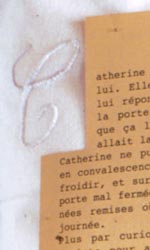
|
… Catherine de Sélys who was sleeping beside him. She asked him where he was going. He answered that the wind was banging the door of one of the garden sheds, that it was stopping him from sleeping, and that he was going to shut it.
Catherine could not have Oskar - still convalescent - risk catching a cold, and worst of all use this excuse of a banging door to go to these confounded sheds where he was shut up all day long as it was.
More out of curiosity than compassion, she insisted on seeing to the awkward door. For the sake of peace and quiet, Oskar let her take charge of his nightmare and went back to bed alone.
He smiled picturing Catherine in front of the sheds which he knew fine well were properly locked and, gradually dozing off again, he murmured: Go on, Catherine, look, look, there's another door banging, find it, find it for me…
Serti had lain down across the bed under the blankets, and as his feet found the fever of his nightmare again, he wrapped his arms around Catherine's still warm pillow. |
|
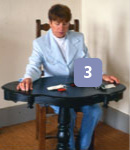
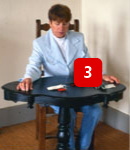

To visit the sheds, ask the caretaker for the keys.
|
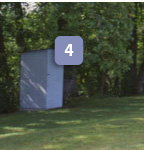


|
When she went inside the first shed, Catherine instinctively left ten inches of daylight in the doorway. It was exactly the same opening as, when she was a child, she demanded of her father when he decreed a curfew at her bedroom door. Left in the semi-darkness, she could then play games of death throes, her preferred one being that of Yseult, launched on a frail raft at the top of a two hundred and fifty foot waterfall. She would then climb up onto the chest of drawers, lean forward and drop heavily onto her bed.
One evening, her mother came later than usual to her room to tidy away the washing she had just ironed. Totally ignoring each other, the one was busying herself in the chest of drawers while the other prepared for her death throes at the top of the falls. But when her mother, after a perfunctory goodnight, closed her bedroom door without leaving it ajar, Catherine realized that her father could no longer hear her from his office, and that he could not even ask her to make less noise. She suddenly realized that she was really playing in the void, and was so dizzied by this that for the first time she felt what it is really like to fall from a height of two hundred and fifty feet. |
|


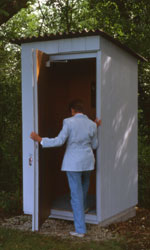
|
Opening with difficulty the door of the second shed, Catherine let out a little cry which had an echo that made her voice sound different and took her back many years to a time when she lived alone with her father, after her mother had left them. She used to spend hours watching him work in his office, and especially waiting for the telephone to ring. She was always enthralled at the ease with which her father would answer the phone and use her mother's voice to say, Hold on, I'll see if he's in. He would go to the door, open it loudly and call upstairs, then come back to the phone. If he felt like talking to the caller, he would use his own voice; otherwise the female voice would say, "He's out just now, but he'll call you as soon as he gets home."
One day, Catherine was surprised to hear her father answer the phone and say in a voice that was new to her, Hold on, I'll see if he's in. He went to the door but did not even call out to himself, he seemed lost. He stayed for so long in the doorway trying to get his bearings that Catherine took pity on the caller and answered the phone. She then heard in the distance her mother's voice engaging in a little small talk and then asking if her father was in. Catherine said he was and called softly to him up the stairs, then came back to the phone to imitate his voice to perfection.
|
|


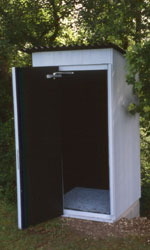
|
When she found herself in the third shed, Catherine saw that Oskar had daubed some unbelievably aggressive and obscene graffiti all over the walls inside. Nobody was spared by his insults, not his wartime comrades nor yet herself.
How had the gentle Oskar been able to take it out like this on his nearest and dearest? Disturbed rather than hurt, Catherine lowered her gaze and discovered on a small table the Diary Oskar had carried around with him during his wartime years, and which he had never let anyone read.
The first page carried a dedication to herself.
The following pages contained no notes, but to her great amazement, showed a large number of preliminary sketches for the graffiti spread across the walls. The slightest insult had been sketched at least a hundred times over; the colours used, the thickness of the letters, everything had been researched down to the finest detail. Catherine was devastated to see in what artificial hell Oskar was losing himself. Determined to do whatever it took to get him out of it, she decided to place the Diary on the top of the half-open door, hoping that the next day it would fall with all its weight on Oskar's head and thereby inspire insults that were more spontaneous.
Unfortunately she was unable to get the Diary to balance on top of the door. After several failed attempts, she threw it on the floor in annoyance, and surprised herself by saying out loud one of the things written on the wall. Through the perfect dynamics of the form and colours of the graffiti, Catherine was drawn in spite of herself into a spiral which led her to say all the words in the shed, louder and louder until she was shouting. The insults answered each other like an endless tide. By dint of spitting on the world, Catherine soon felt carried away in a sea of desolation. Then she was out at sea, where the words we shout have no meaning other than to remind us that we are still holding our head out of the water. |
|























